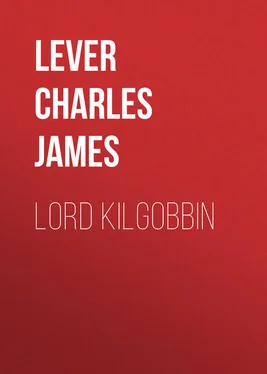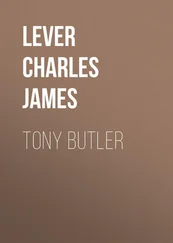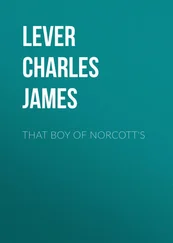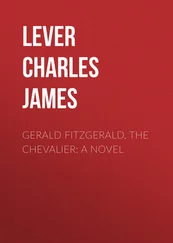Charles Lever - Lord Kilgobbin
Здесь есть возможность читать онлайн «Charles Lever - Lord Kilgobbin» — ознакомительный отрывок электронной книги совершенно бесплатно, а после прочтения отрывка купить полную версию. В некоторых случаях можно слушать аудио, скачать через торрент в формате fb2 и присутствует краткое содержание. Жанр: literature_19, foreign_antique, foreign_prose, на английском языке. Описание произведения, (предисловие) а так же отзывы посетителей доступны на портале библиотеки ЛибКат.
- Название:Lord Kilgobbin
- Автор:
- Жанр:
- Год:неизвестен
- ISBN:нет данных
- Рейтинг книги:3 / 5. Голосов: 1
-
Избранное:Добавить в избранное
- Отзывы:
-
Ваша оценка:
- 60
- 1
- 2
- 3
- 4
- 5
Lord Kilgobbin: краткое содержание, описание и аннотация
Предлагаем к чтению аннотацию, описание, краткое содержание или предисловие (зависит от того, что написал сам автор книги «Lord Kilgobbin»). Если вы не нашли необходимую информацию о книге — напишите в комментариях, мы постараемся отыскать её.
Lord Kilgobbin — читать онлайн ознакомительный отрывок
Ниже представлен текст книги, разбитый по страницам. Система сохранения места последней прочитанной страницы, позволяет с удобством читать онлайн бесплатно книгу «Lord Kilgobbin», без необходимости каждый раз заново искать на чём Вы остановились. Поставьте закладку, и сможете в любой момент перейти на страницу, на которой закончили чтение.
Интервал:
Закладка:
Charles James Lever
Lord Kilgobbin
CHAPTER I
Some one has said that almost all that Ireland possesses of picturesque beauty is to be found on, or in the immediate neighbourhood of, the seaboard; and if we except some brief patches of river scenery on the Nore and the Blackwater, and a part of Lough Erne, the assertion is not devoid of truth. The dreary expanse called the Bog of Allen, which occupies a tableland in the centre of the island, stretches away for miles – flat, sad-coloured, and monotonous, fissured in every direction by channels of dark-tinted water, in which the very fish take the same sad colour. This tract is almost without trace of habitation, save where, at distant intervals, utter destitution has raised a mud-hovel, undistinguishable from the hillocks of turf around it.
Fringing this broad waste, little patches of cultivation are to be seen: small potato-gardens, as they are called, or a few roods of oats, green even in the late autumn; but, strangely enough, with nothing to show where the humble tiller of the soil is living, nor, often, any visible road to these isolated spots of culture. Gradually, however – but very gradually – the prospect brightens. Fields with inclosures, and a cabin or two, are to be met with; a solitary tree, generally an ash, will be seen; some rude instrument of husbandry, or an ass-cart, will show that we are emerging from the region of complete destitution and approaching a land of at least struggling civilisation. At last, and by a transition that is not always easy to mark, the scene glides into those rich pasture-lands and well-tilled farms that form the wealth of the midland counties. Gentlemen’s seats and waving plantations succeed, and we are in a country of comfort and abundance.
On this border-land between fertility and destitution, and on a tract which had probably once been part of the Bog itself, there stood – there stands still – a short, square tower, battlemented at top, and surmounted with a pointed roof, which seems to grow out of a cluster of farm-buildings, so surrounded is its base by roofs of thatch and slates. Incongruous, vulgar, and ugly in every way, the old keep appears to look down on them – time-worn and battered as it is – as might a reduced gentleman regard the unworthy associates with which an altered fortune had linked him. This is all that remains of Kilgobbin Castle.
In the guidebooks we read that it was once a place of strength and importance, and that Hugh de Lacy – the same bold knight ‘who had won all Ireland for the English from the Shannon to the sea’ – had taken this castle from a native chieftain called Neal O’Caharney, whose family he had slain, all save one; and then it adds: ‘Sir Hugh came one day, with three Englishmen, that he might show them the castle, when there came to him a youth of the men of Meath – a certain Gilla Naher O’Mahey, foster-brother of O’Caharney himself – with his battle-axe concealed beneath his cloak, and while De Lacy was reading the petition he gave him, he dealt him such a blow that his head flew off many yards away, both head and body being afterwards buried in the ditch of the castle.’
The annals of Kilronan further relate that the O’Caharneys became adherents of the English – dropping their Irish designation, and calling themselves Kearney; and in this way were restored to a part of the lands and the castle of Kilgobbin – ‘by favour of which act of grace,’ says the chronicle, ‘they were bound to raise a becoming monument over the brave knight, Hugh de Lacy, whom their kinsman had so treacherously slain; but they did no more of this than one large stone of granite, and no inscription thereon: thus showing that at all times, and with all men, the O’Caharneys were false knaves and untrue to their word.’
In later times, again, the Kearneys returned to the old faith of their fathers and followed the fortunes of King James; one of them, Michael O’Kearney, having acted as aide-de-camp at the ‘Boyne,’ and conducted the king to Kilgobbin, where he passed the night after the defeat, and, as the tradition records, held a court the next morning, at which he thanked the owner of the castle for his hospitality, and created him on the spot a viscount by the style and title of Lord Kilgobbin.
It is needless to say that the newly-created noble saw good reason to keep his elevation to himself. They were somewhat critical times just then for the adherents of the lost cause, and the followers of King William were keen at scenting out any disloyalty that might be turned to good account by a confiscation. The Kearneys, however, were prudent. They entertained a Dutch officer, Van Straaten, on King William’s staff, and gave such valuable information besides as to the condition of the country, that no suspicions of disloyalty attached to them.
To these succeeded more peaceful times, during which the Kearneys were more engaged in endeavouring to reconstruct the fallen condition of their fortunes than in political intrigue. Indeed, a very small portion of the original estate now remained to them, and of what once had produced above four thousand a year, there was left a property barely worth eight hundred.
The present owner, with whose fortunes we are more Immediately concerned, was a widower. Mathew Kearney’s family consisted of a son and a daughter: the former about two-and-twenty, the latter four years younger, though to all appearance there did not seem a year between them.
Mathew Kearney himself was a man of about fifty-four or fifty-six; hale, handsome, and powerful; his snow-white hair and bright complexion, with his full grey eyes and regular teeth giving him an air of genial cordiality at first sight which was fully confirmed by further acquaintance. So long as the world went well with him, Mathew seemed to enjoy life thoroughly, and even its rubs he bore with an easy jocularity that showed what a stout heart he could oppose to Fortune. A long minority had provided him with a considerable sum on his coming of age, but he spent it freely, and when it was exhausted, continued to live on at the same rate as before, till at last, as creditors grew pressing, and mortgages threatened foreclosure, he saw himself reduced to something less than one-fifth of his former outlay; and though he seemed to address himself to the task with a bold spirit and a resolute mind, the old habits were too deeply rooted to be eradicated, and the pleasant companionship of his equals, his life at the club in Dublin, his joyous conviviality, no longer possible, he suffered himself to descend to an inferior rank, and sought his associates amongst humbler men, whose flattering reception of him soon reconciled him to his fallen condition. His companions were now the small farmers of the neighbourhood and the shopkeepers in the adjoining town of Moate, to whose habits and modes of thought and expression he gradually conformed, till it became positively irksome to himself to keep the company of his equals. Whether, however, it was that age had breached the stronghold of his good spirits, or that conscience rebuked him for having derogated from his station, certain it is that all his buoyancy failed him when away from society, and that in the quietness of his home he was depressed and dispirited to a degree; and to that genial temper, which once he could count on against every reverse that befell him, there now succeeded an irritable, peevish spirit, that led him to attribute every annoyance he met with to some fault or shortcoming of others.
By his neighbours in the town and by his tenantry he was always addressed as ‘My lord,’ and treated with all the deference that pertained to such difference of station. By the gentry, however, when at rare occasions he met them, he was known as Mr. Kearney; and in the village post-office, the letters with the name Mathew Kearney, Esq., were perpetual reminders of what rank was accorded him by that wider section of the world that lived beyond the shadow of Kilgobbin Castle.
Читать дальшеИнтервал:
Закладка:
Похожие книги на «Lord Kilgobbin»
Представляем Вашему вниманию похожие книги на «Lord Kilgobbin» списком для выбора. Мы отобрали схожую по названию и смыслу литературу в надежде предоставить читателям больше вариантов отыскать новые, интересные, ещё непрочитанные произведения.
Обсуждение, отзывы о книге «Lord Kilgobbin» и просто собственные мнения читателей. Оставьте ваши комментарии, напишите, что Вы думаете о произведении, его смысле или главных героях. Укажите что конкретно понравилось, а что нет, и почему Вы так считаете.












